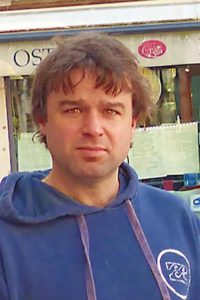Of all the music Dean and Kevin wrote and recorded together, this ballad is far and away my favorite. It is a quietly transfixing anthem of wayward drift and redemption. Dean composed it not long after his recovery from an addiction to alcohol that had taken hold of him after a terrifying car accident when he was 16, with him at the wheel. The boys recorded it at Dean’s apartment in Fort Collins, Colorado, where he’d invited his brother, by then afflicted with schizophrenia, to spend several months with him. Dean sings lead; Kev sings harmony and contributes the majestic solo midway through, which I describe below.
FROM CHAPTER 15 OF NO ONE CARES ABOUT CRAZY PEOPLE, “. . .something unexplainable. . .”
 Dean’s self-willed recovery—reprieve is probably the better word—held benefits for his younger brother. Kevin was able to make it through his spring semester [at the Berklee School of Music] without another setback. Dean invited him to spend the summer in Fort Collins, passing up the chance to return to his beloved Front Range for road-building work. He had rented an apartment on the first floor of a modest brown wood-frame house in a residential neighborhood not far from the university campus. Kevin gratefully accepted, bringing with him his Martin and amp, and the prescription drugs that were now a part of his daily obligations.
Dean’s self-willed recovery—reprieve is probably the better word—held benefits for his younger brother. Kevin was able to make it through his spring semester [at the Berklee School of Music] without another setback. Dean invited him to spend the summer in Fort Collins, passing up the chance to return to his beloved Front Range for road-building work. He had rented an apartment on the first floor of a modest brown wood-frame house in a residential neighborhood not far from the university campus. Kevin gratefully accepted, bringing with him his Martin and amp, and the prescription drugs that were now a part of his daily obligations.
The two of them had a fine old time, the best time of their lives together. They played coffeehouses and bars around Fort Collins and along the winding mountain roads above the city. Sometimes Kevin set aside his guitar and backed Dean up on a borrowed drum-set, playing as though it were the only instrument he had ever touched. Dean wrote a new flurry of ballads, including the two best pieces of his life, and the brothers captured them all on the TEAC recorder that Dean had used for his earlier songs. When Honoree and I arrived for a mid-summer visit, the two were as eager to let us hear them as Kevin had been to play the Booby pieces for me in the Burlington airport two years earlier. They tugged us into Kevin’s room almost before we had set our bags down, and flipped on the TEAC.
We listened first to “Annie Don’t Wake the Day,” Dean’s madcap romp about a night on the town with a frolicsome, laughing girl who skips and dances through the revels, sits in briefly with a bar band, then whirls on, “back out on the street with the bright lights shinin’ away.” Dean sings lead vocals and alternates with Kevin in a jubilant guitar bridge, two solos apiece, the brothers driving hard, a pair of young tigers bursting loose from their cages.
“It’s been a long, crazy night, but don’t wake the day!”
That was for starters. The anthem that followed, the cathedral of notes and lyrics that meditate on loss and journey and hope, on redemption-through-letting-go, stopped our breathing and cupped us in its guileless majesty.
Its title was—is—will always be—“The River East of Home.” Dean wrote it and sang lead; Kevin, harmony. A bridge in the midst of the verses brings up Kevin’s guitar in a cascade of notes that seem to fall from a high place and gather for a moment in a pool before overflowing and dropping again, until they find resolution in the flowing melody at the base.
The opening image is of a figure on horseback, forging along a western mountain path until horse and rider fetch up “at some forgotten fountain.” The rider tries to push his filly on through. “But though it wasn’t wide/She buckled and she balked/She couldn’t see the other side.” The rider tells us of his years of roving between the wilds and mountains. Sometimes he’s on an Arizona highway, right down that center line. Sometimes, crossing water, he falls, and stays down “until I’m good and ready. When I can’t fight the current no more/You’ll find me in the eddy.”
But always, the chorus tells us, the rider is searching. Just as Yeats’s wanderer searches for the silver apples of the moon, the golden apples of the sun, the rider is on a quest for the elusive River East of Home. It sounds as though his quest will be eternal. But then, “One chipped and faded chapel shines up out of the valley.” The rider ventures through the doorway, because a voice, long forgotten, calls him. “I said my life’s been driftin.’ He said that there’s an answer. And if I just believe, this slender reed becomes an anchor.
“I let the river go.”

 This is one of my favorite photographs of Dean. I took it during our visit to Italy in 2008, three years after Kevin’s death. Honoree had dreamed of a family visit to Italy for years, and we finally made it–but not in time for our younger son to enjoy the splendors of the country with us. Dean was 27 then, still devastated by the loss of his brother–perhaps more than we realized–but still resilient, even as the “prodromal” phase of his own affliction with schizophrenia was advancing. I made this photo through the window of a cafe beside a harbor on Capri, where Honoree and I were having a light lunch. Dean, who was still capable of joy and discovery, had decided to take his notebook and pen outside, where he positioned himself on the rocks by the water, in the sunshine, and channeled his inspiration into his journal.
This is one of my favorite photographs of Dean. I took it during our visit to Italy in 2008, three years after Kevin’s death. Honoree had dreamed of a family visit to Italy for years, and we finally made it–but not in time for our younger son to enjoy the splendors of the country with us. Dean was 27 then, still devastated by the loss of his brother–perhaps more than we realized–but still resilient, even as the “prodromal” phase of his own affliction with schizophrenia was advancing. I made this photo through the window of a cafe beside a harbor on Capri, where Honoree and I were having a light lunch. Dean, who was still capable of joy and discovery, had decided to take his notebook and pen outside, where he positioned himself on the rocks by the water, in the sunshine, and channeled his inspiration into his journal.


